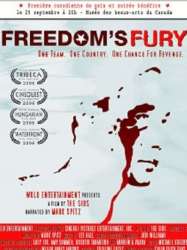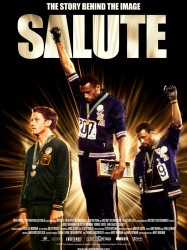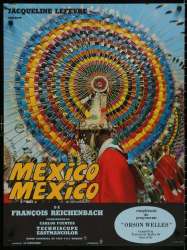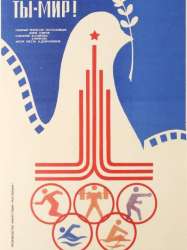Fighting Gravity (2009)

If you like this film, let us know!
- Infos
- Casting
- Technical infos
- Photos
- Videos
- Film quotes
- Characters
- Music
- Awards
Fighting Gravity is a documentary produced by Virginia Madsen and directed by Alex Mar for Empire 8 productions and Screen Sirens. The documentary screened in 2009 and followed 15 passionate women athletes' fight for their sport's inclusion in the Olympic Games. These 15 ski jumping athletes fought for their right to compete in their sport in the Vancouver Winter Olympics in 2010. Starting in the Olympics in Chamonix in 1924, the Winter Olympics have always held ski jumping competitions but restricted to men.
The documentary mainly follows the American ski jumper Lindsey Van who describes how she feels about the exclusion of women in the professional ski jumping world. The documentary follows the process of the girls' lawsuit against the International Olympic Committee for gender discrimination. Although Canadian courts ruled in June 2009 in favour of the IOC, the latter decided less than two years later to accept women in ski jumping competitions starting in 2014 at the Sochi Winter Olympics.
A documentary was produced in 2012 touching the same subject called Ready to Fly.
Comments
Leave comment :
Suggestions of similar film to Fighting Gravity
There are 4182 films with the same themes (including 21 films with the same 3 themes than Fighting Gravity), to have finally 70 suggestions of similar films.If you liked Fighting Gravity, you will probably like those similar films :

Olympia 52 (1952)
Directed by Chris Marker
Origin France
Genres Documentary
Themes Sports films, Documentary films about sports, Films about the Olympic Games
Rating67%





Le film Olympia 52 peut être considéré comme un documentaire. il s'agit d'une commande de la Direction Générale de la Jeunesse et des Sports. Le film de Chris Marker s'attache à montrer ce que le public présent dans les tribunes peut voir du déroulement des épreuves olympiques. On y retrouve donc les images des compétitions mais aussi des scènes de préparation des athlètes. Cela donne un rythme particulier au film avec une alternance de "temps forts" et de "temps faibles". On peut également observer de nombreux plans de coupes montrant le public dans les tribunes. Ce dernier point est né d'une contrainte imposée par le comité olympique pour le tournage des films amateurs depuis les gradins. Chris Marker en a fait un parti pris qui donne au film une autre vision du sport plus centrée sur ceux qui le regardent que ceux qui le pratiquent.

White Rock (1977)
Directed by Tony Maylam
Genres Documentary
Themes Sports films, Documentary films about sports, Films about the Olympic Games
Actors James Coburn
Rating70%






Freedom's Fury (2006)
, 1h30Directed by Colin Keith Gray
Origin USA
Genres Documentary, Historical
Themes Sports films, Documentary films about sports, Films about the Olympic Games
Rating74%





Lors des Jeux olympiques d'été de 1956 de Melbourne, les équipes masculines de water-polo de Hongrie et de l'Union soviétique doivent s'affronter en demi-finales, le match ayant lieu peu après l'Insurrection de Budapest écrasée par l'Armée rouge. L'équipe hongroise n'a été informée des détails de la répression brutale effectuée par les Soviétiques qu'à son arrivée en Australie, et l'animosité entre les deux équipes est à son comble. Le match entrera dans l'histoire des Jeux Olympiques sous le nom de Bain de sang de Melbourne. Le documentaire est axé sur le joueur hongrois Ervin Zádor et est narré par Mark Spitz.
 , 3h21
, 3h21Directed by Leni Riefenstahl
Origin German
Genres Documentary
Themes Politique, Sports films, Athletics films, Documentary films about sports, Films about the Olympic Games, Political films
Actors Leni Riefenstahl
Rating76%





La première partie d'Olympia, un documentaire sur les Jeux olympiques de 1936 à Berlin, réalisé par la réalisatrice allemande Leni Riefenstahl. Le film a été projeté dans les salles en 1938 et à nouveau en 1952 après la chute du régime nazi.

Salute (2008)
Directed by Matt Norman
Genres Documentary
Themes Sports films, Documentary films about sports, Films about the Olympic Games, Documentary films about historical events
Rating75%





The film provides an insight into an incident at the 1968 Summer Olympics which saw two United States athletes, Tommie Smith and John Carlos, give the black power salute from the victory dais after the 200 metres final. The film focuses on the third man on the dias, silver medal winner Peter Norman, who showed his support for Smith and Carlos by donning an "Olympic Project for Human Rights" (OPHR) badge on his way to the podium. It was also Norman who suggested to Smith and Carlos that they share the black gloves used in their salute, after Carlos had left his gloves in the Olympic Village. This is the reason for Smith raising his right fist, while Carlos raised his left. Asked later about his support of Smith and Carlos' cause by the world's press, Norman said he opposed his country's government's White Australia policy.
 , 1h30
, 1h30Directed by François Reichenbach
Genres Documentary
Themes Sports films, Documentary films about sports, Films about the Olympic Games
Les Jeux olympiques d'été de Mexico en 1968.

Stade 81 (1981)
, 14minutesDirected by Jaco Van Dormael
Genres Documentary
Themes Sports films, Documentary films about sports, Films about the Olympic Games

Themes Sports films, Documentary films about sports, Films about the Olympic Games, Documentary films about war, Documentary films about historical events, Documentaire sur une personnalité, Documentary films about health care, Films about disabilities, Political films

13 Days in France (1968)
Directed by Claude Lelouch, François Reichenbach, Guy Gilles
Origin France
Genres Documentary, Historical
Themes Sports films, Documentary films about sports, Films about the Olympic Games
Actors Dalida, Johnny Hallyday
Rating66%





Documentaire sur les Jeux Olympiques de Grenoble de 1968. Plus qu'aux compétitions sportives (ski, bobsleigh, hockey), le film s'intéresse aux à-côtés qui entourent toute manifestation.

O Sport, You Are Peace! (1981)
, 2hDirected by Fyodor Khitruk, Youri Ozerov
Genres Documentary, Animation
Themes Sports films, Documentary films about sports, Films about the Olympic Games
Rating66%





 Connection
Connection